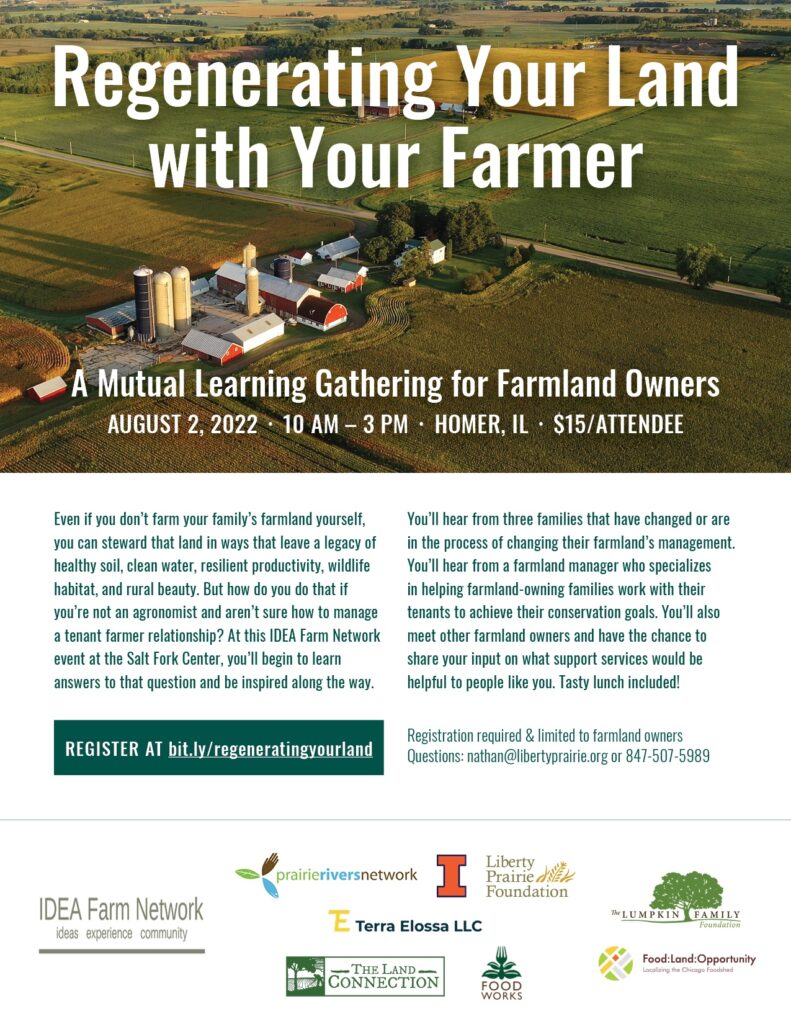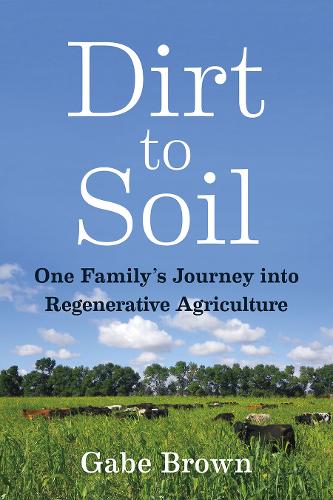When you think about farmers, you probably assume they own the land they farm. And you may well assume the farmers are the only ones who can decide how farming is done on the land.
In fact, there are many farmland owners who do not do the farming. And, in fact, those farmland owners can decide what kind of farming they want done on their land.
According to an insightful report from The Nature Conservancy, 41 percent of all U.S farmland is owned by a non-farming landowner and that figure is 62 percent in Midwest. In McHenry County (just east of Lake County, Illinois, where we live), that figure is over 80 percent!
The news that Bill and Melinda Gates had become the largest private farmland owners in the country highlighted this phenomenon.
If someone uses your property in a way that you agreed they could, the logic is clear. You are responsible in part for what they do and the impacts of what they do. This means that farmland owners who don’t farm are still important decision-makers in our country’s food and agriculture system.
And that means they have a whole lot to do with the stewarding of God’s earth.
After all, fifty-two percent of America’s land mass is used for agriculture.
But do farmland owners apply stewardship values to the management of their farmland to the degree they could and should?
The answer is generally not.
That same report from The Nature Conservancy I quoted from earlier revealed that 80 percent of the landowners surveyed relied more on their farmers for information about conservation than any other source.
It is true that many farmers do take conservation seriously. They do so, however, within the paradigm of farming as they know it. That paradigm is a production-oriented, industrial approach. That paradigm, even if tweaked and refined, generally results in declining soil life, erosion, a dead zone in the Gulf of Mexico, and miles and miles of land where a monarch butterfly cannot find a single milkweed.
But thanks to pioneers in regenerative agriculture (which is rediscovering principles of food production indigenous peoples have known for millennia), we now know there is a very different paradigm for agricullture that is better for God’s earth and good for the farmer, too. Gabe Brown, a Christian farmer, exemplifies what that kind of farming can look like. Check out his book, this podcast, and this video to learn more.
If you are a farmland owner who doesn’t farm, I urge you to apply your Christian faith to how you manage your farmland.
Ask yourself these questions. How well that does the farming on my land reflect the values I find in the Bible? How well does the farming on my land reflect what I know of God and God’s Creation through the Bible and my own experiences in Creation?
Our faith is clear that we do not own this earth.
As Dr. Allen Williams puts it, God put us here to be both servants and masters of that earth. We are not here just to use the earth and then escape to heaven.
It is clear, especially from the Old Testament, that we are to have limits to how we use Creation. Remember that for the Israelites even the land was to have its sabbath every seventh year. This was likely, in part, a wise systeming for maintaining the fertility of the soil. But the command was also teaching the Israelites that the land, too, had its own needs that mattered to God.
That priniciple has not expired. Efficiency and economic production are not the greatest good for God.
It is also clear, especially from the New Testament, that our hearts are remade by faith in Jesus. When they are, we will reflect the fruits of the Spirit (Galations 5:22-23) – love, joy, peace, patience, kindness, goodness, faithfulness, gentleness, self-control – in all we do. I believe those principles apply to how to we treat people and how we treat God’s earth.
From the Bible, we see, too, that the living things of this earth have their own relationship with God and are sustained by God. In fact, from Psalm 148 and Revelation 5:13 we can conclude that the living things of this earth are part of the choir of Creation that we are also members of.
In other words, the land a Christian owns, whether it is a suburban lot or a 500-acre farm, is not just a financial asset. It is not “real estate.”
The land you own is a unique portion of the living earth that is part of the overall world that God so loves. It is alive. It supports other life in complex ecological relationships. What is done to the portion of God’s earth that you temporarily steward impacts land and water and living things far beyond it.
I don’t mean to suggest that being a fully engaged steward of your farmland with the goal of prospering Creation is easy.
You may rely on the income from the land for a significant portion of your yearly budget.
Agriculture and the ecology of soil, land, and water are complex. Farming has its own language, its own tools and equipment.
And the status quo approach to agriculture is a powerful status quo. It takes energy and tenacity and conviction to persist in a different approach. What’s more, you likely have an existing relationship with the farming renter who is likely a family member or friend in your community.
Complexity, however, is not a justification for inaction or procrastination.
Through its wisdom literature, the Bible prepares us for applying God’s values in a complicated world that is not always black and white.
Jewish and Christian thinkers have also produced wonderful writings and bodies of wisdom guidance. Use those resources to grow your wisdom and apply what you learn to your farmland management.
Wisdom also requires you to learn more about soil life, the realities of conventional farming, regenerative agriculture, farmland ownership, and the situation of your current farmer in your county. Being responsible for your farmland requires that you know enough to judge whether the farming is contributign to the life of God’s earth or depleting it. Loving your neighbor means being as fair as you can be to the farmer you lease to.
Then apply your faith-based wisdom to how you manage your farmland in your particular situation.
For example, if you are asking the farmer to invest in new, complex practices that will have long-term benefits for your land, then you should give the farmer long-term lease so he or she can also enjoy some of those benefits they are making possilbe.
You can also learn wisdom from other farmland owners. An Illinois landowner I know made clear to her renter (who happened to be here nephew) that she intended to move the farming of her land in an organic, sustainble direction. When the nephew showed no willingness or interest in learning more and adjusting to her values, even in an incremental way, the landowner had no choice but to not renew the lease when it expired. Sometimes, making those hard decisions are the only way to be true to God’s values. I’m happy to report, by the way, that the landowner eventually found a farmer completely in synch with her values.
In a different case, a landowner with land in Iowa planned to move that property to organic as a better way of caring for it. The farmer was uneasy because organic farming approach is quite different and requires much more documentation. But both the farmer and the landowner wanted to maintain their relationship. The farmer was open to changing his ways.
The landowner applied wisdom and love of neighobr. She is paying for an organic farming agronomist to advise and help the farmer during the transition process whenever the farmer needs it. This is enabling the farmer to feel more comfortable and be more successful. Its a gesture, too, that shows the landowner is willing to share the risks of the change.

As part of my work that I mentioned earlier, I am helping to organize an event on Tuesday, August, 2nd for non-farming farmland owners. The event will feature three farmland owners who will share their experiences and lessons from moving towards better stewardship of their farmland. It’s extremely helpful to learn from other farmland owners.
I’m happy to report that more and more private and public farmland owners are working to improve their farmland stewardship. If you own farmland, I hope you will be bravely take full ownership of the responsibility and opportunity you have to prosper God’s earth. If you know a farmland owner on the journey of improving the stewardship of that land, please help them and encourage them and pray for them.
Don’t hesitate to reach out to me if I can I help you connect to the resources that would help you.





